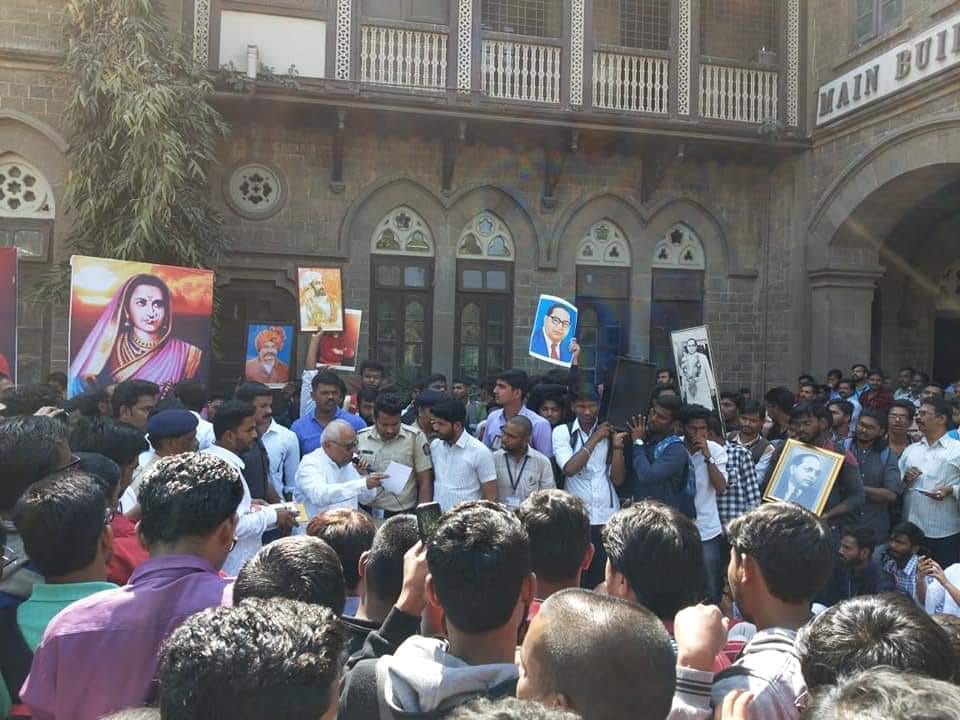India is the largest democracy, which proudly claims to provide all of its citizens with fundamental rights, ensuring a sense of freedom and equality. However, ensuring that these rights are actually practised is another story altogether.
A recent occurrence will help drive the idea home and make the above point clearer.
Fergusson College, Pune, experienced rising tension as students protested against the college authorities’ last minute decision to cancel the lecture by retired Justice B.G. Kolse-Patil.
Retired Justice Kolse-Patil was invited by the principal to deliver a speech on the Indian Constitution, but the college authorities cancelled the lecture at the last minute without informing the retired Judge on Monday, last week.
Despite the cancellation, Justice Kolse-Patil went ahead with a 20 minute speech in the college premises, in which he accused the college to have subverted under pressure from the right-wing. He also accused the Bhartiya Janata Party of trying to quash any form of dissent.
“Today, judges who keep a photo of former Rashtriya Swayamsevak Sangh (RSS) chief M.S. Golwalkar are elevated to Chief Justices. Institutional appointments are made solely on the basis of one’s affinity with the Sangh or the BJP,” said the retired Judge Kolse-Patil.
The incident also saw a clash between the Patit Pavan Sanghatana (PPS), a group affiliated with the fringe right-wing which was trying to sabotage the speech, and Ambedkarite groups, which had gathered to hear the former judge. Members of the ABVP had also gathered to protest against the speech.

Anil Thombare, the secretary of the Pune unit of the ABVP said that, “Since there were allegations of harassment against him, we were not in favour of him delivering a lecture on the college campus. There are other cases being probed against him as well. When we came to know that he was going ahead despite the college cancelling permission, we reached the spot because being a retired judge he should respect the rules and not try creating a political atmosphere on a college campus where students come to study.”The college justified its actions by stating that the principal did not have the authority to grant permission and that the right to do the same rested with the governing body of the Deccan Education Society (DES) which is responsible for running the college.
If the reason behind the sudden cancellation of his speech is what Justice Kolse-Patil alleges it to be, then our very fundamental rights are being compromised.
With the coming of the BJP government, one of the features of our constitution that has often been subject to complex clashes and overlaps in definition is the contemporarily contested right to freedom of speech. We suddenly find that criticising the government has become equivalent to sedition.
The term ‘anti-Modi’ or ‘anti-BJP’ are being thrown around left and right, with an underlying impression that they are either ‘anti-national’ or ‘anti-Hindu’ and creating unnecessary disruption. And this gives rise to the question: where does one draw a line?
While the freedom of speech gives expression to one’s beliefs and ideas, it also requires for people to have a certain degree of tolerance. And while it’s easy to feel entitled and empowered by the former, the latter is rarely followed through.
Add to this, the constant use of religion as a political tactic and the unavoidable problems that arise when the practise of the right to free expression by one ends up hurting the other, compromising on equality and making people sceptical about secularism.
Law, politics, and religion are tangled in a stubborn and complex knot in India, and all these are volatile ingredients. If the balance tips even a little bit to the wrong side, then intercommunal peace is disturbed, sowing the seeds of discord.
However, all contemplation aside, the entire incident was peculiar (like every other such controversy) where it was difficult to decide as to what was right.
Did the college authorities really cancel the speech simply due to lack of basic protocol not being followed regarding the invite, or are campuses being wrongfully pressurised? Did the ABVP and other right wing groups have a genuine concern for students’ education, or were they simply using the whole sexual harassment and the Elgaar Parishad case as a cover to meet its other agendas?
These are some questions which may be answered today, and then buried and forgotten tomorrow. But, that is not the larger question. The larger question is, why is criticising the government no longer acceptable? And just how much time do we have before the thin line between criticism and sedition is deliberately erased, and our right to express and cross check our own government is taken away from us?
Featured image source: Tejas Tayade/Facebook; Vaibhav Rane/Wikimedia Commons.
The post Fergusson College: How Rights And Politics Overlapped During A Speech On The Constitution appeared first and originally on Youth Ki Awaaz and is a copyright of the same. Please do not republish.